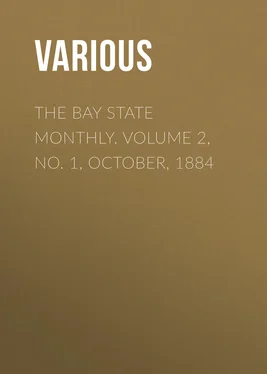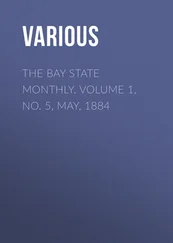Various - The Bay State Monthly. Volume 2, No. 1, October, 1884
Здесь есть возможность читать онлайн «Various - The Bay State Monthly. Volume 2, No. 1, October, 1884» — ознакомительный отрывок электронной книги совершенно бесплатно, а после прочтения отрывка купить полную версию. В некоторых случаях можно слушать аудио, скачать через торрент в формате fb2 и присутствует краткое содержание. Жанр: foreign_antique, periodic, foreign_edu, на английском языке. Описание произведения, (предисловие) а так же отзывы посетителей доступны на портале библиотеки ЛибКат.
- Название:The Bay State Monthly. Volume 2, No. 1, October, 1884
- Автор:
- Жанр:
- Год:неизвестен
- ISBN:нет данных
- Рейтинг книги:4 / 5. Голосов: 1
-
Избранное:Добавить в избранное
- Отзывы:
-
Ваша оценка:
- 80
- 1
- 2
- 3
- 4
- 5
The Bay State Monthly. Volume 2, No. 1, October, 1884: краткое содержание, описание и аннотация
Предлагаем к чтению аннотацию, описание, краткое содержание или предисловие (зависит от того, что написал сам автор книги «The Bay State Monthly. Volume 2, No. 1, October, 1884»). Если вы не нашли необходимую информацию о книге — напишите в комментариях, мы постараемся отыскать её.
The Bay State Monthly. Volume 2, No. 1, October, 1884 — читать онлайн ознакомительный отрывок
Ниже представлен текст книги, разбитый по страницам. Система сохранения места последней прочитанной страницы, позволяет с удобством читать онлайн бесплатно книгу «The Bay State Monthly. Volume 2, No. 1, October, 1884», без необходимости каждый раз заново искать на чём Вы остановились. Поставьте закладку, и сможете в любой момент перейти на страницу, на которой закончили чтение.
Интервал:
Закладка:
Various
The Bay State Monthly – Volume 2, No. 1, October, 1884
JAMES GILLESPIE BLAINE
In the long list of illustrious men who have held the high office of President of the United States, a few names stand out with such prominence as to be constantly before the American people. While Adams, Jefferson, Monroe, Jackson, Grant, and others, did the country service that never will be forgotten, it is indisputable that Washington, Lincoln, and Garfield gained a firmer hold upon the confidence and affection of the masses than any others. And now, as we approach another presidential campaign, the result of which is to place in the highest office of the nation a new man, it is alike a source of pride and satisfaction that the Republican party has put in nomination a man, who, if elected, will bring to the discharge of his duties as high a degree of honesty as Washington, as thorough an acquaintance with human nature as Lincoln, and as profound a knowledge of political economy as Garfield. Through all the years of his manhood he has been a central figure in American politics, and his achievements are indelibly written on almost every page of American history for the last quarter of a century. With such a man as a candidate the country may well congratulate itself that if he proves to be the choice of the majority he will, by his ability and experience, bring as great renown to the office as any of his predecessors, and that under his guidance the material prosperity and intellectual growth of the nation will be such as to gain for his administration great popular favor, the admiration of his friends, and the respect of all nations.
James Gillespie Blaine, the nominee of the Republican party for President of the United States, was born on January 31, 1830, in Washington County, in the southwestern corner of Pennsylvania, in West Brownsville, a village on the west bank of the Monongahela. Here Neil Gillespie, before the British army left America at the close of the Revolution, had established his family, purchasing the land of the Indians. Nearly twenty years later the Blaines came from Carlisle, seeking investment and development in this new West, and the father of James G. Blaine, who had left Carlisle when a child, married the daughter of Neil Gillespie the second.
The first of the Blaine family of whom much is known was Colonel Ephraim Blaine, who lived at Chester, and in the Revolution was purveyor-general of the Pennsylvania troops, and incidentally of the whole Revolutionary array. He married Rebekah Galbraith in 1765. Elaine is a well-known Scotch name. Galbraith and Gillespie are Scotch-Irish; in fact, the ancestors of James G. Blaine were nearly all Scotch and Irish. It is a circumstance worthy of comment that Blaine comes from a stock which has furnished the United States with many of her ablest public men, notably among them being Andrew Jackson and Horace Greeley.
Colonel Ephraim Blaine had two sons named Robert and James, and each of these sons named his son for Colonel Ephraim Blaine. Old Ephraim Blaine did not leave his property to his sons, but to these two grandsons, (1) Ephraim, who remained in Carlisle, and (2) Ephraim Lyon Blaine, who grew up in western Pennsylvania. Ephraim Lyon Blaine was named for his mother, Miss Lyon, the daughter of Samuel Lyon from about Carlisle. Ephraim Lyon Blaine married Miss Gillespie, a devout member of the Roman Catholic Church, but most of their seven children—five boys and two girls—adhered to the traditional faith of the Blaines. The second of these sons, James Gillespie Blaine, is the subject of this sketch. He would have inherited large blended fortunes, had not his father, like his grandfather, been a spendthrift. Therefore, soon after James G. Blaine was born his parents had to move out of the big house which they could no longer keep up, and occupy a frame-house called the Pringle dwelling, also in West Brownsville, about a quarter of a mile distant. Here young Elaine lived and went to school both in Brownsville and in West Brownsville, until his father was elected prothonotary of the county, in 1843, when the whole family removed to Little Washington, twenty-four miles distant.
James G. entered Washington College in 1843, being then thirteen years of age, and became at once prominent as a scholar among the two or three hundred other lads from all parts of the country. He was also a leader in athletic sports. He was not a bookworm, but he was a close student and possessed the happy faculty of assimilating knowledge from books and tutors far more easily and quickly than most of his fellows. In debating-societies he held his own well, and was conspicuous by his ability to control and direct others.
After leaving college young Blaine started for Kentucky to carve out his own fortune. He went to Blue Lick Springs and became a professor in the Western Military Institute, in which there were about four hundred and fifty boys. A retired officer who was a student there at the time relates that Professor Blaine was a thin, handsome, earnest young man, with the same fascinating manners he has now. He was popular with the boys, who trusted him and made friends with him from the first. He knew the given name of every one, and he knew his shortcomings and his strong points. He was a man of great personal courage, and during a fight between the faculty of the school and the owners of the springs, involving some questions about the removal of the school, he behaved in the bravest manner, fighting hard but keeping cool. Revolvers and knives were freely used, but Blaine only used his well-disciplined muscle. Colonel Thornton F. Johnson was the principal of the school, and his wife had a young ladies' school at Millersburg, twenty miles distant. There Blaine met Miss Harriet Stanwood, who subsequently became his wife. She was a Maine girl of excellent family sent to Kentucky to be educated.
After teaching for a while Blaine left Kentucky and went to Philadelphia to study law. While there he taught for a short time at the blind asylum and also wrote for the newspapers. He soon, however, was irresistibly attracted to the State of Maine, and left his native State for a home in the community with which his name is now indissolubly connected. It is somewhat remarkable that this ambitious young man should have gone East instead of West, choosing a State which the young men were fast leaving—one whose population in the last forty years has increased very little. He is, indeed, almost the only man who has gone East in the last half-century and risen to any prominence.
Mr. Blaine went to Maine in 1853, and soon afterward married Miss Stanwood, whose family are well known in New England. Through their influence he soon found an occupation in journalism, and until 1860 was actively engaged in editing at different times the Kennebec Journal and the Portland Daily Advertiser. He retained a part ownership in the Kennebec Journal until it began to hamper him in his political career, and then he sold out. A friend has said of him as a journalist: "I have often thought that a great editor, as great perhaps as Horace Greeley, was lost when Mr. Blaine went into politics. He possesses all the qualities of a great journalist: he has a phenomenal memory; he remembers circumstances, dates, names, and places more readily than any other man I ever met."
Wielding a strong, vigorous, aggressive pen, Mr. Blaine soon made its power felt among politicians. He went to Maine at a time when the Whig and Democratic parties were breaking up. Previous to 1854 the Democratic party had governed the State for a quarter of a century, but its power was broken in the September election of that year, through a temporary union of the anti-slavery and temperance elements. In 1855 the different wings of the new party were well consolidated, and in the famous Frémont campaign of 1856 they carried the State, electing Hannibal Hamlin governor by twenty-four thousand majority. Mr. Blaine, during all these exciting times, did not by any means confine himself to writing political leaders. He took an active part in politics, attending Republican meetings throughout the State, and soon made himself one of the recognized Republican leaders in Maine. Of this period of his career, the late Governor Kent, of Maine, who himself stood in the front rank of public men in his State, once wrote as follows:—
Читать дальшеИнтервал:
Закладка:
Похожие книги на «The Bay State Monthly. Volume 2, No. 1, October, 1884»
Представляем Вашему вниманию похожие книги на «The Bay State Monthly. Volume 2, No. 1, October, 1884» списком для выбора. Мы отобрали схожую по названию и смыслу литературу в надежде предоставить читателям больше вариантов отыскать новые, интересные, ещё непрочитанные произведения.
Обсуждение, отзывы о книге «The Bay State Monthly. Volume 2, No. 1, October, 1884» и просто собственные мнения читателей. Оставьте ваши комментарии, напишите, что Вы думаете о произведении, его смысле или главных героях. Укажите что конкретно понравилось, а что нет, и почему Вы так считаете.












